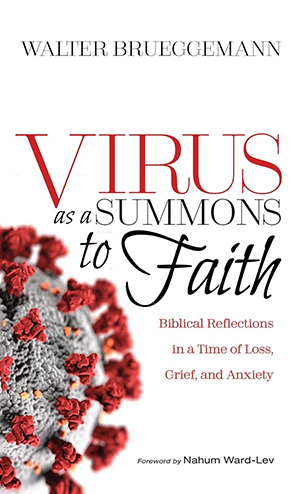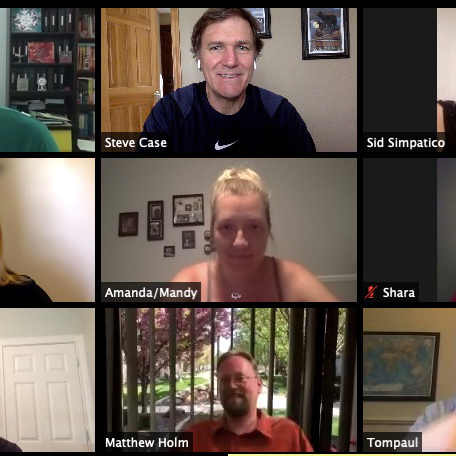Book Review: Virus as a Summons to Faith: Biblical Reflections in a Time of Loss, Grief, and Anxiety

Virus as a Summons to Faith: Biblical Reflections in a Time of Loss, Grief, and Anxiety by Walter Brueggemann. Cascade Books. Eugene, OR. 2020. Total pages: 71.
This short booklet came in response to the COVID-19 virus that has impacted the world, including the number one country (in cases and deaths): the United States. Old Testament scholar Walter Brueggemann, known to draw on the messages of the Old Testament prophets and their call for social justice, cobbled some of his previous articles as well as some new creations for a Biblical response to the pandemic.
Instead of reading the book as a flow of a continuous thought, the reader will do better to treat each chapter as a stand-alone presentation. Each chapter ends with a prayer borne out of the message of that particular chapter. While certain chapters will provide personal and/or professional meaning for one person, others will prefer other chapters. But each reader is certain to find helpful, if challenging, pieces throughout the book.
For example, the preface reminds us that the festal cry, “Hosanna,” which we think in terms of celebration, first meant “Save us, we pray.” Such a “zinger” raises the question of whether or not anyone is shouting, “Hosanna” during this pandemic. If anyone does, would this be a petition or a praise?
Brueggemann quoted Donald Trump (March 19, 2020) in the first chapter. Instead of reading this politically, consider it as a statement from a human, maybe even you: “I don’t see it (coronavirus) as an act of God; I see it as something no one saw coming.” This raises a number of questions. Do you agree with the quoted statement? Was the coronavirus an act of God? If so, why would God do this? If not, is God not in the picture? Did no one see this coming? Was it a surprise to God? If God is part of the issue, then either God needs to do some explaining or else we need a better understanding. If God isn’t part of this issue, then what does God have to do with our lives (since COVID seems to have taken over our lives)? Drawing on Exodus, Leviticus, and Job, acknowledging the pandemic as a plague, the author offered three perspectives for the Godly to relate to it. 1) God’s punishment for those who have violated his covenant with them; 2) God’s action in using a negative force for his own purposes; or 3) Our best explanations fall far short of God’s holiness and therefore don’t make much sense to fellow humans. Brueggemann stated, “None of these interpretive options is of much use or interest in the midst of the virus” (p. 14). Then what is one to do? The author then compared God with the best of science. Which side would you choose—God or science?
Another chapter combined the triad covenant curses of “sword, famine, and pestilence/plague” from Leviticus 26 and Deuteronomy 28. This combination seemed like a “go to” warning in both Jeremiah and Ezekiel. And God even gave King David these three options when David fed his ego by ordering an unnecessary census (2 Samuel 24:13). David opted for the third curse of God since it placed him at the mercy of God rather than of others. And that sparked Brueggemann’s suggestion that we take God’s mercy and chesed (God’s lovingkindness) since few of us would claim immunity to breaking God’s covenant.
Another chapter invited the reader to engage in prayer, not to bargain with God or to seek God’s attention; but simply to trust Yahweh during disaster. “When I shut up the heavens so that there is no rain, or command the locust to devour the land, or send pestilence among my people, if my people who are called by my name humble themselves, pray, seek my face, and turn from their wicked ways, then I will hear from heaven, and will forgive their sin and heal their land.” 2 Chronicles 7:13-14. We usually quote only verse 14 and omit verse 13. God’s people have plenty to do in addition to pray. But prayer is part of it! The pandemic might grab our attention, but our response needs to be a return to faithfulness to Yahweh rather than simply banking on a vaccine that “one day it (the virus) will disappear. . . like a miracle.”
Brueggemann even took one Psalm (77) and divided it into halves. Verses 1-9, loaded with first person “I’s” in contrast to verses 11-20 loaded with “God” and “Yahweh” and “he” and “you.” In short, the Psalm moves from a focus on one’s self to a focus on God. While the hinge verse ,10, remains difficult to translate, it is even more difficult to determine. Why do people change from a self-focus to a God-focus? This makes all the difference in the world, and yet it can’t be ordered, predicted, or determined with any certainty in advance.
The book wouldn’t be complete without a chapter on lament/groan. This seems foreign to most with our feel-good cultural expectation. Rather than blind optimism, the Old Testament writers cry out in lament. Remember than an entire book of the Old Testament has been dedicated to this very thing. If you prefer a New Testament perspective, recall that the cross precedes the crown; Good Friday came before Resurrection Sunday. We have much to learn about lament, and Scripture provides the guidance needed. The prayer that ends the final chapter of this booklet includes: “Hear, help, save!”
This short booklet, in this dire time, can give you personal and professional aid as a Christian leader in this unique COVID time that turns out to not be so unique in the pages of Scripture.
 |
Steve Case, PhD, quarantines in Carmichael, California, where he now spends more time writing than speaking at gatherings. |
